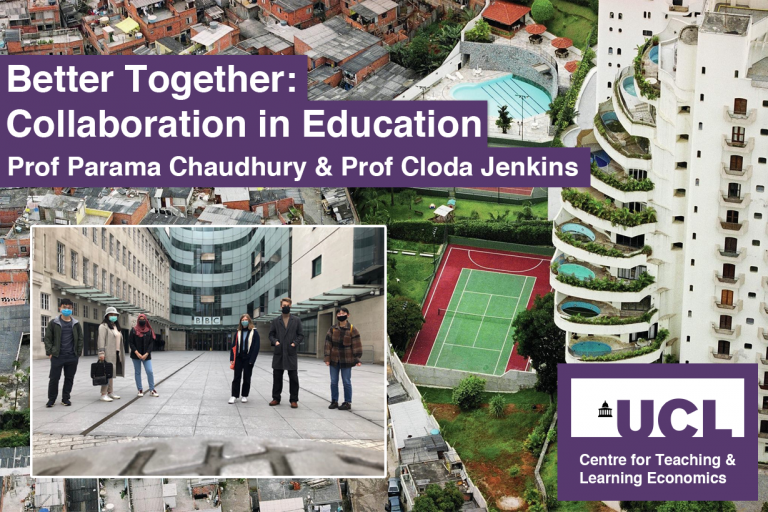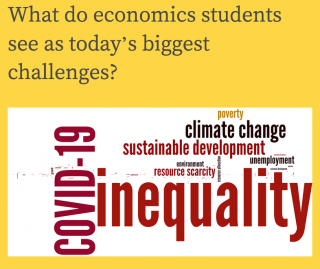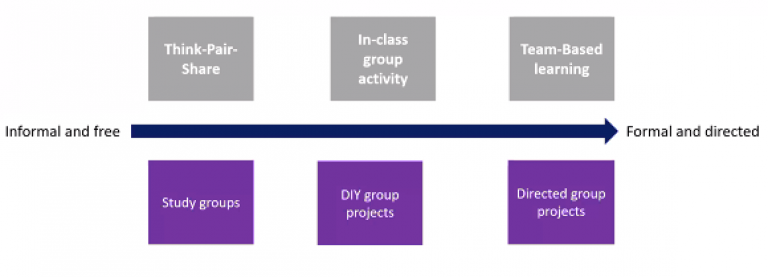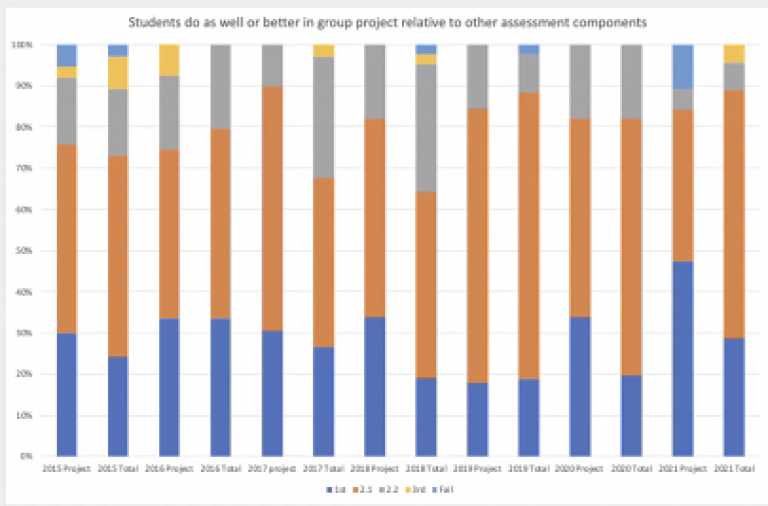Student blog - Better Together: Collaboration in Education
31 March 2021
Arshiya Sawhney & Shivam Gujral, BSc Economics students, UCL Department of Economics, blog about Professor Parama Chaudhury and Professor Cloda Jenkins' joint inaugural lecture.

3 March 2021: This Inaugural Lecture is part of the 2020/21 series for the UCL Faculty of Arts & Humanities and Faculty of Social & Historical Sciences. Professor Parama Chaudhury and Professor Cloda Jenkins, as the newly titled Professorial Teaching Fellows from UCL Economics, present their research on education design and delivery, highlighting the theme of ‘Collaborative Learning’.
In a world where pressing issues like climate change, economic inequality, financial crises and the recent pandemic dominate mainstream discourse, UCL Professorial Teaching Fellows Cloda Jenkins and Parama Chaudhury delve deeper into the foundational methods of teaching and learning. Their role at UCL goes beyond module lecturers and taps into other dimensions of academia as the co-founders of the Centre for Teaching and Learning Economics (CTaLE). Their research interests and work range from addressing the BAME achievement gap to improving student employability.
The lecture was opened by Professor Sasha Roseneil, Dean of the UCL Faculty of Social & Historical Sciences, and Professor Wendy Carlin from the UCL Department of Economics. They laid emphasis on the milestones marked: the first ever joint inaugural lecture, and the first Professorial Teaching Fellows from the UCL Department of Economics.
The ‘Better Together’ model was initially conceptualised by Professor Jenkins and Professor Chaudhury as their first joint project and paper. Their ideas take a dual approach to encourage collaborative learning, addressing challenges which may be faced by students and organisers alike. Thus, the key takeaways from the lecture can be categorised under three distinct themes stemming from the perspective of the relevant stakeholders in education.
- Shaping teaching through the lens of Economic research
Economists are trained to tease out causality in any kind of evaluation, which leads on to the discussion of experimental work in an educational setting. As Professor Chaudhury explains, “identifying causal links can be very difficult especially with the difficulty of running Randomised Control Trials due to regulatory constraints”. Such issues create obstacles for the curriculum design research community due to a lack of “hard evidence”. Additional logistical challenges are also present throughout this process, such as supervising team activities in large cohorts and designing virtual yet interactive projects.
In order to overcome these issues and implement the ‘Better Together’ model, both Professors conducted qualitative research and used it to inform their quantitative analysis. Their aim was to ensure students are able to “collaborate in different ways, at different levels, and in different contexts”. As visualised in the diagram below, they propose starting off small and gradually building up to a more formal, constructed approach. The final step involves formulating structured modules based on collaborative learning within and outside of the classroom.
To evaluate their intervention, the Professors used a combination of data analysis and extensive qualitative feedback collected from students and peers. This further paves the way into discussions about student learning and the impact on lecturers.
- Student Learning and Experience
The Professors’ keen recommendations are on the basis of unparalleled benefits to students and their educational experience. These range from simply enabling a better understanding of the material to picking apart preconceived notions through group discussions. Furthermore, collaborative learning enables students to leverage comparative advantage of fellow team members, enhancing long-term project management capabilities and thus employability prospects. Finally, there is strong evidence of a positive correlation between the outcomes of assessed group projects and overall module performance as shown below.
While these points make collaborative learning seem like a no-brainer, it often does not translate into student satisfaction immediately. Realising the value of this approach may come further down the line when exposed to the job market.
Despite challenges, the professors have endeavoured to expose students to the merits and discomforts of this way of learning in a safe and supportive environment through various initiatives.
The First Year Challenge is one such project which embodies the “collaborative learning” ethos, where students are expected to produce a short multimedia clip touching upon the overarching themes of ‘Capitalism, Growth and Inequality’. Its resounding success was recognised at The Times Higher Education Awards 2016, and the project has now been adopted by several other institutions including LSE, Bristol and St Andrews. Other initiatives include the undergraduate research-based Explore Econ Conference, along with ongoing projects under CTaLE like the TeachEconference with over 300 global attendees in 2020, Outreach programmes, and collaborative Research Assistant opportunities.
- Impact on Lecturer
As the discussion on evaluating the model continues, it is also worth considering the model's impact on the teaching faculty. Their research overturns a common misconception that such an approach could save preparation time. The introduction of synchronous and asynchronous teaching may actually raise the time and effort invested into organising the module. This extra time may be channelled towards adding additional aspects like group discussions and activities mid-lecture. It is also important to ensure sufficient incentives to avoid free-riding and elicit satisfactory effort throughout the model.
A collaborative learning environment diversifies the role of a lecturer into a facilitator and even a coach among others. Despite the apparent complexities, Professor Jenkins emphasises ‘Job Satisfaction’ to address concerns over why lecturers should adopt such an approach. She elaborates by specifying her experience of gaining global perspective on issues, for instance an improved knowledge of the regulatory environment in South Korea and Malaysia among others. Moreover, professors get to interact more closely with students even in larger cohorts and witness their growth. Lastly, collaborative learning can lead to unexpected spill overs, including a wider culture among students and between students and staff of working together.
Leading a revolution in the education sector
After weighing both sides of the equation, the Professors maintain their strong stance on the merits of the ‘Better Together’ learning model as its benefits undoubtedly outweigh the costs. The argument of external validity beyond UCL remains to be proven and is the way forward for this project. The event was concluded by Professor Dilly Fung, who pronounced Professor Jenkins and Professor Chaudhury “shining examples of scholarly leaders”. Their work continues to initiate dialogue and inspire the educational community across the world.
Catch up on the recording of Parama and Cloda's lecture:
Inaugural Lecture Series 2020/21
This lecture is part of the 2020/21 series for UCL's Faculty of Arts & Humanities and Faculty of Social & Historical Sciences. The series provides an opportunity to recognise and celebrate the achievements of our professors who are undertaking research and scholarship of international significance, and offers an insight into the strength and vitality of the arts, humanities and social sciences at UCL.
All our lectures are free to attend and open to all. You don't have to be a UCL staff member or student to come along.
For information on previous and upcoming lectures please visit: https://www.ucl.ac.uk/social-historical-sciences/news-events/inaugural-lectures
 Close
Close





